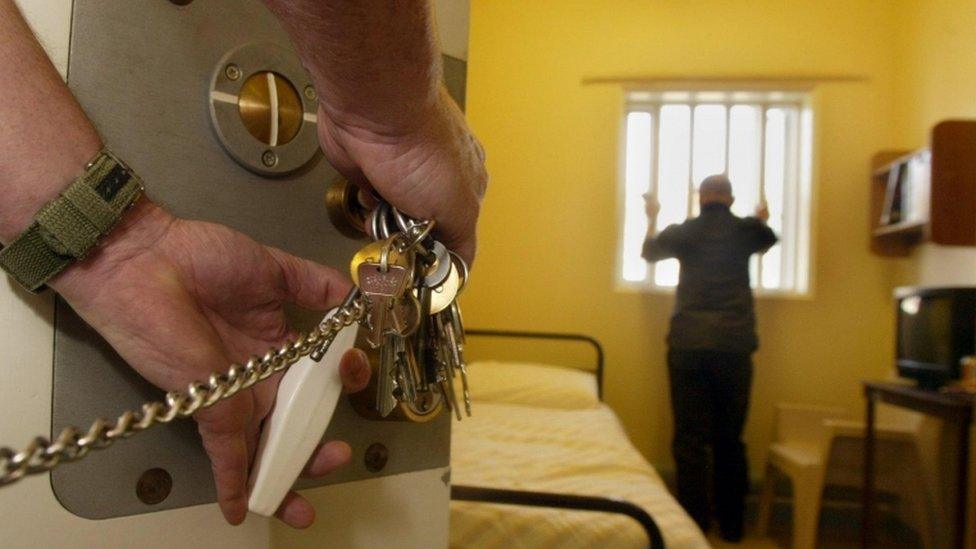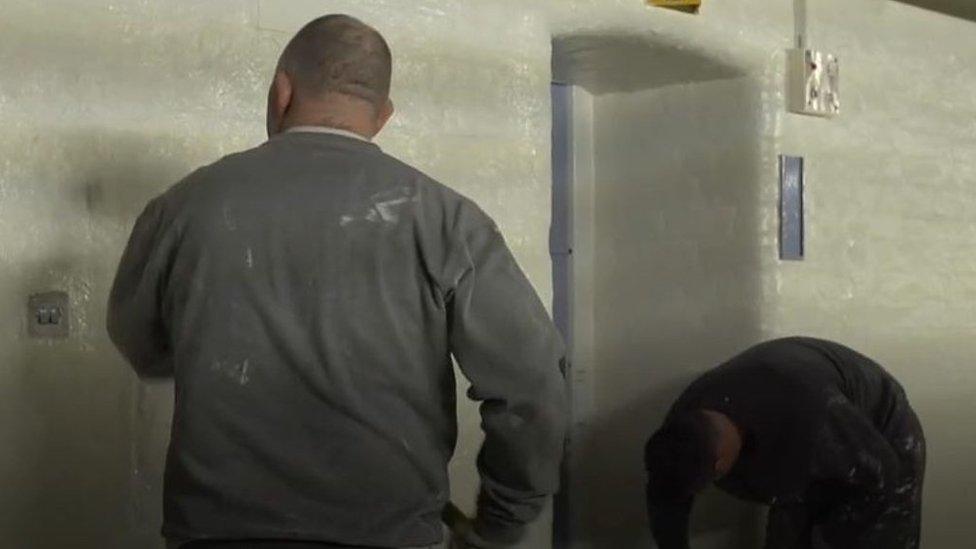More prisoners will be allowed to take outside jobs
- Published

More inmates in England and Wales will be able to leave prison for a day or overnight in order to take jobs.
The relaxing of the rules - six years after they were tightened - is intended to boost prisoners' job prospects.
The government also revealed that 230 new businesses, including Pret A Manger and Greene King, have joined its offender work placement scheme.
Some 300 business were already part of the scheme, which builds partnerships between prisons and employers.
The decision to ease the rules on day and overnight release is part of a government effort to reduce re-offending, which is estimated to cost society £15bn a year.
Release on temporary licence (ROTL) allows prisoners to spend time in the community for short periods, normally towards the end of their sentence.
Last year, 7,700 inmates were able to work outside prison or stay out overnight; under the new measures, it's expected that number will increase by several hundred.
Under the new rules, inmates in open or women's prisons are eligible to undertake paid work immediately after they have passed a "rigorous" risk assessment - previously this was only allowed if the prisoner was within 12 months of release.
Additionally, a restriction on ROTL in the first three months after transferring to open conditions will be lifted and overnight leave can now be considered at an earlier stage.
The application process is also being made more efficient, according to officials.
ROTL numbers fell after a 2013 review by former Justice Secretary Chris Grayling.
That followed convicted killer Ian McLoughlin, who had been allowed out of prison for the day, stabbing a man to death.
Overall, the temporary release of prisoners fell by almost one third in five years.

'Vital element of reintegration into society'

Allowing prisoners who may be nearing the end of their sentence to spend time in the community is a vital element of their reintegration into society.
It may help them secure valuable work experience, gain qualifications or learn new skills. For some inmates it is about re-building family ties.
And for those serving life or indeterminate sentences it is a way for the authorities to gauge whether offenders can be trusted on the outside.
But after the appalling case in 2013 of Ian McLoughlin, the temporary release scheme rules were tightened and the number let out dropped sharply.
That led to complaints from prison reform campaigners that the restrictions, imposed by the former justice secretary Chris Grayling, were too onerous.
Ministers have therefore sought a compromise which they hope will further prisoner rehabilitation - and keep the public safe.

Justice Secretary David Gauke told BBC Radio 4's Today programme: "The evidence and common sense suggests that prisoners who go into work after they leave prison are less likely to re-offend."
He added: "If we just dump them out of prison having not done anything to get them ready for work then I'm afraid the risk of re-offending is that much greater."
He said many organisations already recognised the value of giving offenders a second chance and he urged more businesses to join the movement.
Two daughters open up to their mums about what life has been like on the outside
The Prison Reform Trust welcomed the rule change, calling it a "step in the right direction" but added that "there is much further to go".
The charity's director, Peter Dawson, said "prisoners are serving longer sentences than ever before" and that "these changes will mainly benefit only the minority who have managed to get to an open prison towards the very end of their time inside".
- Published4 February 2019

- Published11 March 2019

- Published11 April 2019
